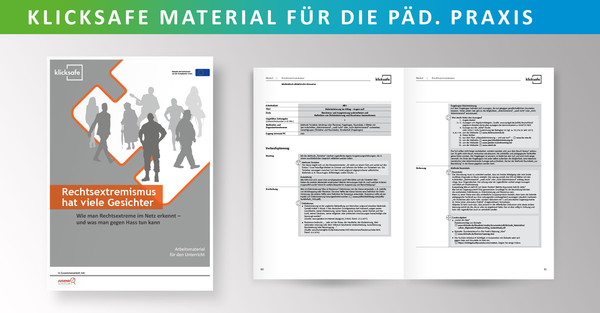The Internet plays a central role in the dissemination of right-wing extremist hate propaganda. Right-wing extremists instrumentalize gaming platforms, messenger groups and other social communities with a wide reach to spread their anti-democratic and racist ideologies. The mechanisms used are usually subtle, contemporary, and tie in with youthful lifeworlds. Right-wing extremist propaganda uses current events, trends and topics as well as political debates. Young people in search of their own identity and a (political) worldview are particularly susceptible and thus at risk in their development. Right-wing extremists offer them a sense of belonging and a world of experience, for example with exciting tent camps or hip flash mob actions. Right-wing extremists stage themselves close to the public via podcasts and livestreams. The websites of right-wing extremists often look harmless, modern and youth-oriented - but the ideology behind them is always the same: anti-democratic, racist and inhuman.
In order to combat right-wing extremist agitation, not only commitment but also well-founded information and pedagogically prepared teaching materials are necessary. The brochure "Right-wing extremism has many faces. How to recognize right-wing extremists on the net - and what to do against hate" by klicksafe and jugendschutz.net combines the specific know-how of various competent organizations.
How right-wing extremist agitation works on the web
It is not always obvious at first glance that right-wing extremist content is behind contemporary web offerings. The tools used by right-wing extremists on the Internet are based on a number of basic strategies:
Modern design
Contrary to the image of the "eternal neo-Nazi," right-wing extremist groups present themselves on the Net with contemporary presences. Professional web design and a youth-oriented look appeal to the visual habits of young people.
Youth subculture
Right-wing extremists consciously tie in with youth subcultures. They seek online proximity to hip topics and activities in order to reach their target group. They conceal their ideological intentions behind the pretextual theme.
Internet phenomena
Whether it's a challenge, a meme or sarcasm: whatever works on the Net is seized upon by right-wing extremists for agitation.
Lifestyle
Many young people are interested in sports and nutrition. Corresponding offers are also popular on the net under catchwords such as "food porn" or "motivation." Some right-wing extremist groups are trying to gain a foothold here.
Right-wing extremist subculture
In addition to adapting popular youth subcultures, the right-wing extremist scene has now developed its own subculture. Experts therefore speak of "right-wing extremist worlds of experience."
Action orientation
The far-right scene tries to stage itself as particularly rebellious and successful with spectacular actions that are deliberately designed for later dissemination on social networks.
Networking
Right-wing extremist groups seek cooperation on the Internet. From more harmless appearances, particularly radical offerings are often only a few clicks away.
Financing
The Net is not only used for agitation. It also plays a decisive role in the financing of right-wing extremist groups. Unlike in stores, Internet commerce promises customers anonymity.
Music
Young people are particularly easy to lure via music. Right-wing extremist music videos can be easily integrated on websites, blogs and social networks.

Facts and figures
In addition to statistics on violations, jugendschutz.net provides information on the trends of right-wing extremist online propaganda and necessary measures in its annual situation report "Right-Wing Extremism on the Net".
Report right-wing extremist content
Have you seen a post online that is inhumane, racist or anti-democratic? Report such posts or calls for hate to the relevant online services. First of all, the services have to determine whether the content is punishable or violates general terms and conditions (GTC). A lot of content is in a gray area. The platforms' support teams then assess whether and how to take action against the content, e.g. by deleting the illegal content or the user accounts in question. Direct reporting of hate content on social media services is not always successful. Reporting and complaints offices have more direct contact with many platform operators and more frequently obtain the deletion of corresponding content. If there is clearly criminally relevant content (sections §86, §86a and §130 use of anti-constitutional symbols or incitement of the people), you can file a report with the police.
Hate and incitement hotlines
Counseling centers & Dropout programs
Many federal states have their own counseling centers and/or authorities that offer parent counseling.
- At Belltower.news, a list of all counseling services can be found, sorted by federal state .
- On the website online-beratung-gegen-rechtsextremismus.de/, people who are confronted with right-wing extremism in their private or professional environment can get advice online. This is possible via e-mail or chat - individually or together with others. This service is free, anonymous and strictly confidential. Individual or group chats for parents are also offered. Regional counseling centers can also be found via this website.
- Within the "Right-wing Extremism and Family" (RuF) center, affected parents and relatives, as well as professionals in educational fields, have the opportunity to receive competent advice on site.
- Belltower.news has listed nationwide and statewide dropout programs that provide support in leaving the right-wing extremist scene.
- Hotlines and dropout programs for right-wing extremists willing to leave the scene are listed at verfassungsschutz.de.
Tips for parents
Explain to your child that he or she may come across right-wing extremist content when searching for certain keywords. Make your child aware that he or she can also recognize such sites by their choice of words and expressions. Anyone who writes about "us Germans" excludes others and sees them as inferior. Those who make supposedly funny jokes ("I steal like all foreigners") may want to test how others react to them in order to identify possible sympathizers. Sayings such as "We love the foreign in the foreign" express demarcation and contempt for others and are not to be accepted. Make the historical context clear to your child: Anyone who incites against minorities is following in the tradition of the National Socialists and their policy of extermination and destruction. Refer to human rights, make clear which advantages your child also enjoys because it is growing up in a democratic society.
It is neither possible nor desirable to completely control young people's Internet consumption. This makes it all the more important that you have an uninhibited and open relationship when it comes to media use. This way, your child will have enough confidence to talk to you about it if he or she has encountered disturbing content without fearing that Internet access is at stake. If you notice or learn that your child has read or seen racist, inhumane, or other hateful posts, have them show or describe the site to you. Talk to your child about the worldview behind these statements and why these posts are inhumane. If your child already shows sympathy for right-wing extremist views, stay calm. Explain objectively what it is about and what the intentions of the right-wing extremists behind it are.
Encourage your child to report right-wing extremist content to appropriate agencies or ask for help in doing so. First points of contact are complaints offices such as jugendschutz.net. In addition, social networks, video platforms or gaming portals usually have buttons for reporting inappropriate content. In forums or on websites, in addition to reporting to the complaints office, you can also contact the operators.
In addition, screenshots and notes (date, time, nickname if available, etc.) should be made as evidence/proof. Depending on the age, you can support your child in this.
Explain to your child that texts do not appear on the Internet by themselves, but have publishers who pursue certain interests. Play detective and find out together who puts which messages online. Who can you believe? What background do the authors and editors have? Why do some blog providers emphasize that they want to protect freedom of expression, which is guaranteed by the Basic Law anyway? What is behind such a phrase? Encourage your child to critically question profiles and messages in social networks before confirming friend requests or contacting other users. What nickname has been chosen? What does the photo look like? What slogans and symbols appear? All of these can be the first clues. Advise your child to only confirm friend requests from people they know personally.
Provide your child with suitable arguments and materials to defend themselves against right-wing extremist slogans or attempts at contact.
Encourage your child to stand up against right-wing extremist propaganda and to expose claims as false and denigrating with facts. Where counter-speech is raised, this signals: right-wing extremists are not tolerated here. If your child is active on social media, encourage him or her to connect with sites and groups that actively oppose right-wing extremism. This will allow him or her to express his or her stance against hate and intolerance. Tip: The app "KonterBunt" can be used to train counter-speech in a playful way.
In this context, also talk to your child about the topic of "data protection and privacy". Private information such as address, telephone number or e-mail address should neither be posted publicly nor visible to all "contacts" on social networks. Even in the case of counter-comments to right-wing extremist statements, no personal data should be revealed that would allow conclusions to be drawn about the full name, place of residence or school. No one needs to expose themselves to the risk of being threatened by right-wing extremists on the Internet or in real life.

